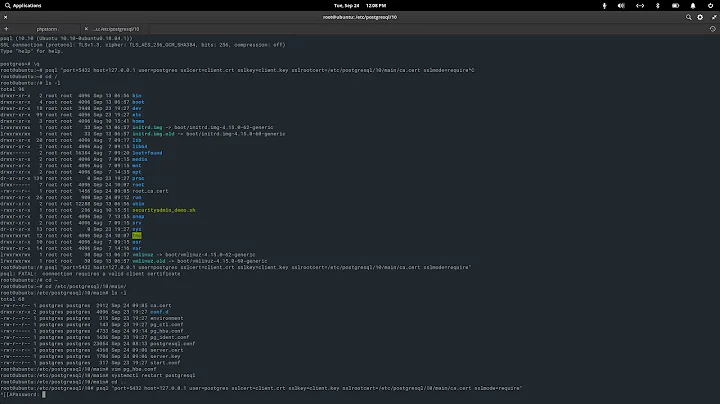How to connect to a remote PostgreSQL database through SSL with Python
Solution 1
Use the psycopg2 module.
You will need to use the ssl options in your connection string, or add them as key word arguments:
import psycopg2
conn = psycopg2.connect(dbname='yourdb', user='dbuser', password='abcd1234', host='server', port='5432', sslmode='require')
In this case sslmode specifies that SSL is required.
To perform server certificate verification you can set sslmode to verify-full or verify-ca. You need to supply the path to the server certificate in sslrootcert. Also set the sslcert and sslkey values to your client certificate and key respectively.
It is explained in detail in the PostgreSQL Connection Strings documentation (see also Parameter Key Words) and in SSL Support.
Solution 2
You may also use an ssh tunnel with paramiko and sshtunnel:
import psycopg2
import paramiko
from sshtunnel import SSHTunnelForwarder
mypkey = paramiko.RSAKey.from_private_key_file('/path/to/private/key')
tunnel = SSHTunnelForwarder(
(host_ip, 22),
ssh_username=username,
ssh_pkey=mypkey,
remote_bind_address=('localhost', psql_port))
tunnel.start()
conn = psycopg2.connect(dbname='gisdata', user=psql_username, password=psql_password, host='127.0.0.1', port=tunnel.local_bind_port)
Solution 3
Adding this for completeness and because I couldn't find it anywhere else on SO. Like @mhawke says, you can use psycopg2, but you can also use any other Python database modules (ORMs, etc) that allow you to manually specify a database postgresql URI (postgresql://[user[:password]@][netloc][:port][/dbname][?param1=value1&...]) to connect to since the sslmode="require" parameter that psycopg2.connect uses to enforce ssl connections is just part of the postgresql:// URI that you use to connect to your database (see 33.1.2. Parameter Key Words). So, if you wanted to use sqlalchemy or another ORM instead of vanilla psycopg2, you can tack your desired sslmode onto the end of your database URI and connect that way.
import sqlalchemy
DATABASE_URI = "postgresql://postgres:postgres@localhost:5432/dbname"
# sqlalchemy 1.4+ uses postgresql:// instead of postgres://
ssl_mode = "?sslmode=require"
DATABASE_URI += ssl_mode
engine = sqlalchemy.create_engine(URI)
Session = sqlalchemy.orm.sessionmaker(bind=engine)
There's a nifty figure (Table 33.1) in the postgres documentation on SSL Support that breaks down the different options you can supply. If you want to use any of the fancier options that require you to specify a path to a specific certificate, you can drop it in with a format string.
Related videos on Youtube
Alex
Updated on May 17, 2021Comments
-
Alex about 3 years
I want to connect to a remote PostgreSQL database through Python to do some basic data analysis. This database requires SSL (verify-ca), along with three files (which I have):
- Server root certificate file
- Client certificate file
- Client key file
I have not been able to find a tutorial which describes how to make this connection with Python. Any help is appreciated.
-
 Games Brainiac over 9 yearspsycopg2. Search that up in google.
Games Brainiac over 9 yearspsycopg2. Search that up in google. -
Alex over 9 years@GamesBrainiac Thanks. I have. The problem is with the added ssl requirements. I could not find the syntax for that.
-
bluesmoon over 7 years@Pep, SSL options are described here: postgresql.org/docs/current/static/… you can pass any of these to the
connectmethod.
-
Jens Timmerman over 7 yearsin django this works if you specify something like: ` 'OPTIONS': { 'sslmode': 'verify-full', 'sslrootcert': '/etc/pki/CA/certs/cabundle.pem'}` as an extra 'option' to your DATABASES['default'] dict.
-
 ljhennessy over 5 years
ljhennessy over 5 years -
mhawke over 5 years@ljhennessy: thanks for pointing that out. I've updated the answer accordingly.
-
user1717828 almost 5 yearsNote to those using MacOS and sqlalchemy, run
pip install psycopg2-binarybefore runningcreate_engine(). -
 Rakesh Nair almost 5 years@mhawke What happens if sslkey file is password protected? Can psycopg2 handle password encrypted key files?
Rakesh Nair almost 5 years@mhawke What happens if sslkey file is password protected? Can psycopg2 handle password encrypted key files? -
francistheturd almost 3 years"You need to supply the path to the server certificate in sslrootcert. Also set the sslcert and sslkey values to your client certificate and key respectively." Supply where? Can someone modify the example please
-
Vineet Menon over 2 years@francistheturd,
(dbname='dbname', user='username', host='localhost', port='5432', sslmode='require', sslcert='ssl.crt', sslkey='ssl.nopass.key')there's a provision forsslpasswordas well, but the version installed at my pc was old. -
P Kernel about 2 years@mhawke Can we try using Environment Variables, How would the connection string look?






